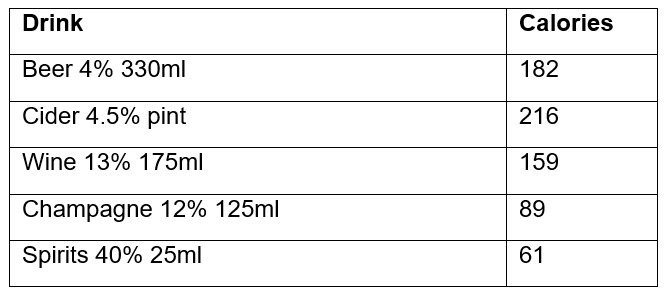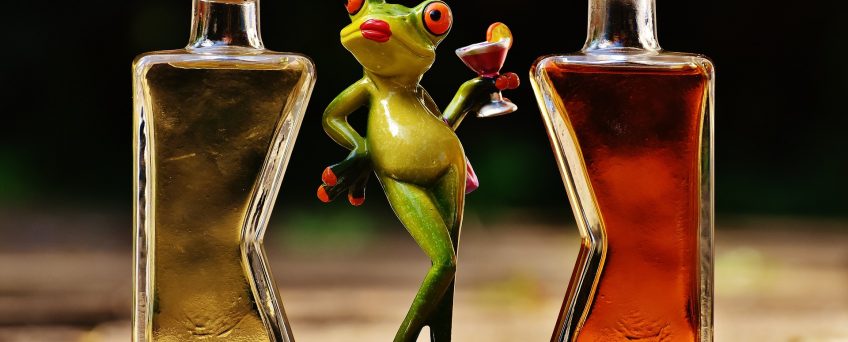Calories in alcohol: How to destroy your diet
Alcoholic drinks on average contain about seven calories per gram, which is nearly as much as pure fat. Many alcoholic drinks are also high in sugar. Studies have shown for example that a pint of beer contains the same number of calories as a slice of pizza. It’s no wonder where the expression beer belly comes from! Unfortunately, no matter what you eat and how much exercise you do, drinking regularly and in large amounts can still leads to weight gain. Here is an overview of the calories in alcohol, and how drinking affects weight loss and diet.
How many calories are in my drink?
Alcohol contains “empty” calories, which basically means they don’t have any nutritional value. is a breakdown of different drinks and their calorie content.

Drinks that have mixers such as fizzy drinks or juice contain even more calories. Next time you’re having a few drinks, think about it like snacking, would you eat 2 or 3 slices of pizza in a row if you’re on a diet? You should try to limit your alcohol content to zero if you want to lose weight fast, and at the very least no more than once every 2 months.
How does alcohol affect weight loss and diet?
There are other ways alcohol can affect weight loss and diet apart from calorie content. Excessive consumption of alcohol can cause problems for your digestion, sleep, and internal organs. It also lowers judgment and can increase food cravings. Here are some examples of how alcohol can get in the way of weight loss and diet.
Alcohol is used as a primary source of fuel
This means that alcohol is burned fast, and before anything else. Your body uses alcohol primarily as fuel meaning other carbohydrates and fats are left behind. This results in excess glucose and lipids, which, unfortunately, are converted into fat.
Alcohol affects your organs
Excessive or long-term consumption of alcohol is dangerous for your liver. Your liver has an important part to play in metabolism. Not only does it filter out toxic substances from your body, but it also metabolises fat, carbohydrates, and protein.
Drinking too much alcohol can cause hepatic steatosis, also known as “fatty liver”. A fat build-up in the liver means it can’t function properly and this can lead to weight gain and other health conditions. This is the first stage of alcoholic related liver disease (ARLD) but a dramatic reduction in alcohol consumption can prevent it from getting worse.
Alcohol affects digestion
Alcohol also causes stress to the stomach and intestines. This slows down the digestion process and negatively affects weight loss and diet. Digestive secretions are decreased which break down food and help it to pass through your body.
Alcohol can cause excess belly fat
Extra calories are stored up as fat in the body. Foods and drinks with high levels of sugar can cause a build-up of visceral fat, which is fat stored around your organs in the abdomen. Heavy drinking can cause a quicker build-up of fat in the abdomen because of the way it affects your digestion.
The more calories you consume in excess, the more likely it is to gain weight rapidly. It’s easy to overdo it with alcoholic drinks and they don’t seem as filling as high-calorie foods. This is where the idea of a beer belly comes from. Unhealthy snacks as an accompaniment don’t help the situation either.
Alcohol can cause problems with sleep
It may seem like drinking can help to put you to sleep but in fact, it can cause periods of wakefulness and unhealthy sleep patterns. A healthy sleep routine is also fundamental to weight loss and diet and has many other health benefits.
Sleep affects your body in different ways. Impaired sleep can lead to an imbalance in the hormones related to hunger and energy storage. A lack of sleep can provoke cravings and cause higher stress levels, neither of which help when you’re trying to lose weight.
Alcohol can cause hormonal imbalance
Alcohol also affects other hormones in your body including testosterone for men. This hormone has an important role to play in metabolism and fat burning capabilities. A high calorie or sugar intake isn’t good for your metabolism and with the combination of low testosterone levels, can result in weight gain, high cholesterol, and high blood pressure.
Hormonal imbalance can lead to unhealthy food cravings. Alcohol also affects your judgment, and often people become more complacent about healthy eating and turn to junk food and takeaways after drinking to excess. This only adds more unnecessary calories.
Where can I learn more?
Our AI Weight Loss Diet focuses on correcting imbalances and natural deficiencies. Your personalised weight loss and diet programme will help reduce cravings and the desire for unhealthy binges. You’ll notice fast weight loss, healthier sleep patterns, and improved overall health and wellbeing.
We have researched which nutrients are more important and the optimum levels to encourage fast weight loss and improved health. This data has then been incorporated into a state-of-the-art artificial intelligence platform. AI Weight Loss Diet uses artificial intelligence technology to handpick your meals individually. Our system is programmed with an algorithm to select meals according to specific needs.
The AI technology identifies meals to balance nutrition and continues to learn and adapt to your dietary requirements and preferences. This means you get optimised nutrition every time and a fast track to digestive balance and weight loss. It’s time to tackle those food and alcohol cravings now and get ready for a healthy new regime.
If you would like to learn more about how AI Weight Loss Diet can activate fast weight loss, start your journey today for more help and advice.






